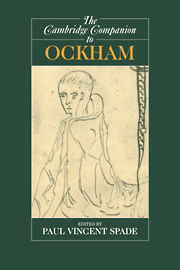Book contents
- Frontmatter
- Introduction
- 1 The Academic and Intellectual Worlds of Ockham
- 2 Some Aspects of Ockham's Logic
- 3 Semantics and Mental Language
- 4 Is There Synonymy in Ockham's Mental Language?
- 5 Ockhams' Nominalist Metaphysics
- 6 Ockham's Semantics and Ontology of the Categories
- 7 Ockham's Philosophy of Nature
- 8 The Mechanisms of Cognition
- 9 Ockham's Misunderstood Theory of Intuitive and Abstractive Cognition
- 10 Ockham's Ethical Theory
- 11 Ockham on Will, Nature, and Morality
- 12 Natural Law and Moral Omnipotence
- 13 The Political Writings
- 14 Ockham on Faith and Reason
- 15 Ockham's Repudiation of Pelagianism
- Bibliography
- Citations
- Index
Introduction
Published online by Cambridge University Press: 28 May 2006
- Frontmatter
- Introduction
- 1 The Academic and Intellectual Worlds of Ockham
- 2 Some Aspects of Ockham's Logic
- 3 Semantics and Mental Language
- 4 Is There Synonymy in Ockham's Mental Language?
- 5 Ockhams' Nominalist Metaphysics
- 6 Ockham's Semantics and Ontology of the Categories
- 7 Ockham's Philosophy of Nature
- 8 The Mechanisms of Cognition
- 9 Ockham's Misunderstood Theory of Intuitive and Abstractive Cognition
- 10 Ockham's Ethical Theory
- 11 Ockham on Will, Nature, and Morality
- 12 Natural Law and Moral Omnipotence
- 13 The Political Writings
- 14 Ockham on Faith and Reason
- 15 Ockham's Repudiation of Pelagianism
- Bibliography
- Citations
- Index
Summary
Standard histories have long recognized that the three most important figures in the philosophy of the High Middle Ages were Thomas Aquinas (1224/5-74), John Duns Scotus (c. 1266-1308), and William of Ockham (c. 1288-1347). Of the three, Aquinas is comparatively well known to modern readers, whereas Scotus and Ockham largely remain mere names.
Even Aquinas, however, is more foreign to students than Plato and Aristotle are, much less Descartes or Hume. Indeed, as Kretzmann and Stump have observed in The Cambridge Companion to Aquinas, such unfamiliarity is characteristic of all medieval philosophy. This sad fact is partly due to the scarcity of translations but more fundamentally to the lack of reliable modern editions of primary texts and thus of good critical analyses and studies of them in the secondary literature.
The situation does not arise from any lack of raw materials but instead, it might be argued, from just the opposite. There are many early printed editions from the late fifteenth and early sixteenth centuries and an enormous number of surviving manuscripts of medieval philosophy and theology. But the early editions are often unreliable, whereas the manuscripts frequently present wildly different versions of the same work. They are written in a highly compressed and arcane system of abbreviation, a kind of shorthand that requires special training to read; early printed editions often retain the same system. Frequently the manuscripts are incompletely cataloged or not cataloged at all, and thus their contents are discovered only by chance.
- Type
- Chapter
- Information
- The Cambridge Companion to Ockham , pp. 1 - 16Publisher: Cambridge University PressPrint publication year: 1999
- 2
- Cited by



